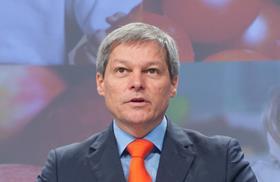
The European Commission (EC) has released a statement following a management committee meeting today, organised to assess the potential impact of Russia sanctions on EU Agriculture products
'The Commission held a very useful first exchange of views with Member State experts this morning on the potential impact of the Russian sanctions announced last week on imports of certain agricultural products,' the EC statement read.
'I have two announcements to make today,' said agriculture commissioner Dacian Cioloș. 'First, as of early next week, I will come forward with the next market stabilisation measure, targeting a number of perishable fruit and vegetable products which are now clearly in difficulty. This action will be proportionate and cost effective.
'Secondly, this exceptional situation we face as a result of Russia's ban requires faster and better access to market data, sector by sector,' he continued. 'That is why we are putting in place as of today a reinforced market monitoring mechanism to which all Member States will contribute. Meetings with Member States will take place on a weekly basis, for a period as long as necessary.
'My message is again clear: I am prepared to propose EU wide measures as and when needed,' Cioloș added. 'Producers from across the EU can be reassured. We are following every sector and every market and as material risks emerge, I will act. Through the reformed Common Agriculture Policy we have the budgetary and legal instruments for European action together with the Member States; market confidence through European solidarity is the overriding objective.'
DG AGRI presented its initial analysis about traditional trade patterns, the current market situation in different sectors, potential alternative sales outlets, and the the potential impact of these measures in broad terms.
However, the Commission noted that it still needs to receive the most up-to-date information to fully assess the market situation in most sectors, and therefore called on Member States to provide the latest detailed market data.
Moreover, in order to follow the evolution of the situation as closely as possible, the EC proposed that there should be weekly meetings with the Member States for the coming months in order to monitor and discuss the situation of all sectors that are affected, in addition to the permanent ongoing written communication.
The EC presented today a preliminary analysis of the main sectors included by the Russian measures – fruit, vegetables, dairy and meat products – while Member States also presented certain figures and commented on the sectors most likely to be worst affected.
The meeting agreed that the situation is the 'most urgent' for certain perishable vegetables hit by the ban, where the season has already begun and a key export market has suddenly disappeared with no immediate prospect of an obvious alternative.
Based on the new information received today from the Member States, the Commission confirmed that it would come forward with appropriate new measures at the beginning of next week, while further measures targeting animals products are being considered.
Such measures would be put forward under the additional flexibility mandated to the Commission in last year’s CAP reform, in the same way that it has announced support measures for the peaches & nectarines sector on 11 August.
The Commission announced its intention to finalise a full analysis of the potential impact of the Russian sanctions on the EU sectors concerned – together with an assessment of the potential policy responses – as soon as possible, with the results to be presented to Member States and the European Parliament in order to facilitate further political discussions on the subject.



